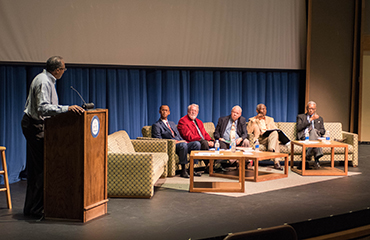
Hundreds of community members, college students, faculty, and staff filled the seats of the Abney Cultural Center Auditorium on Friday, Nov. 3 to participate in a panel discussion on "The Life and Legacy of Dr. Benjamin E. Mays." Held on the campus of Lander University, the program was co-hosted by the university's department of History and Philosophy and the GLEAMS Historical Site as part of a weekend of events planned in honor of Dr. Benjamin E. Mays.
Led by moderator Rev. Christopher Thomas, director of GLEAMS Dr. Benjamin E. Mays Historical Preservation Site, each panelist provided insight into the life of Dr. Mays.
A quiet, almost reverent atmosphere permeated the room as the panel of five experts shared their thoughts, personal memories, and experiences with the audience.
Born and raised in the Greenwood area, Dr. Mays is regarded as one of the country's most influential citizens during the height of the Civil Rights Movement. During his service as President of Morehouse College in Atlanta, Dr. Mays became both spiritual and intellectual mentor to Dr. Martin Luther King Jr.
Reverend Dr. Otis Moss, Jr., a former student of Dr. Mays while attending Howard University, recalled the strong influence Mays had on his own life. "I walked six miles just to hear him speak. When I could not get inside, I waited outside by his car __ just to shake his hand."
Dr. Lawrence E. Carter, Dean of the Martin Luther King, Jr. Chapel at Morehouse College recounted a story from Mays' early childhood during a time when forced segregation, tension, angry lynching's and other acts of violence were a common part of life. Mays' earliest memories were those of a mob of white men approaching his family's home on horseback with guns drawn during the Phoenix Riot of 1898. The mob forced his father, a tenant farmer, to remove his hat and bow down before them __ repeatedly __ in a forced act of respect. Mays was just five years old at the time, but it would leave a deep impression on his life.
"I am now convinced that (childhood event) was the beginning and birth of the spirit in Mays to rebel," observed Carter. "He spent his entire life commanding respect _ and he won." Mays also advised his students at Morehouse to "avoid putting themselves in a position where they could be disrespected and to never let anyone dismiss you with the wave of a hand or the shrug of a shoulder".